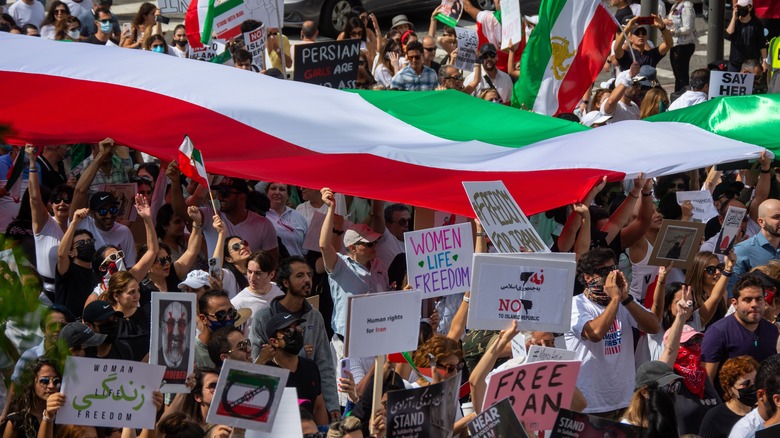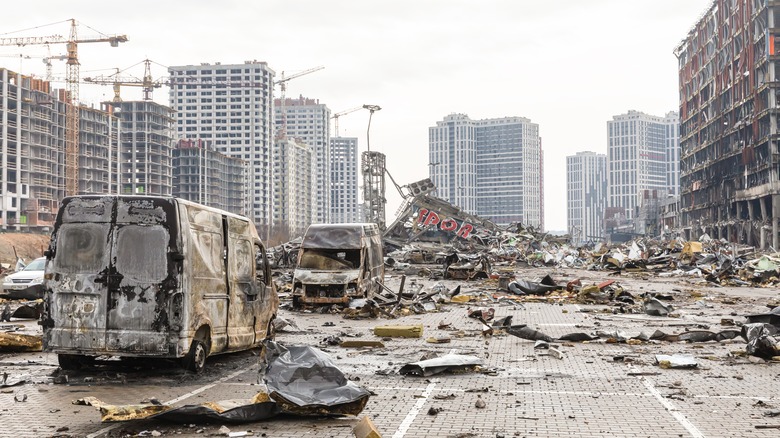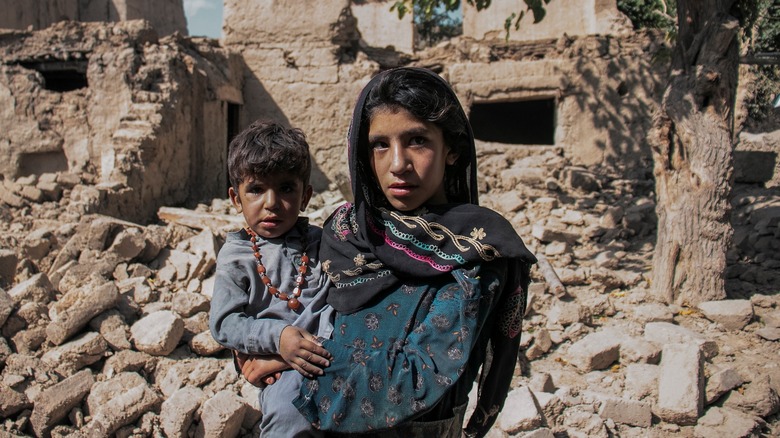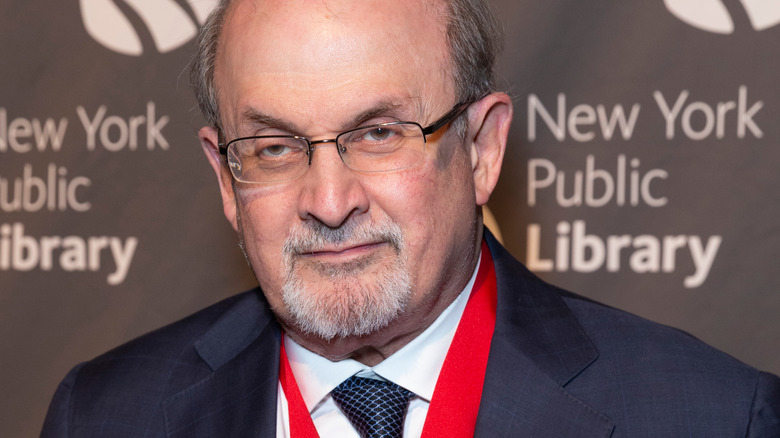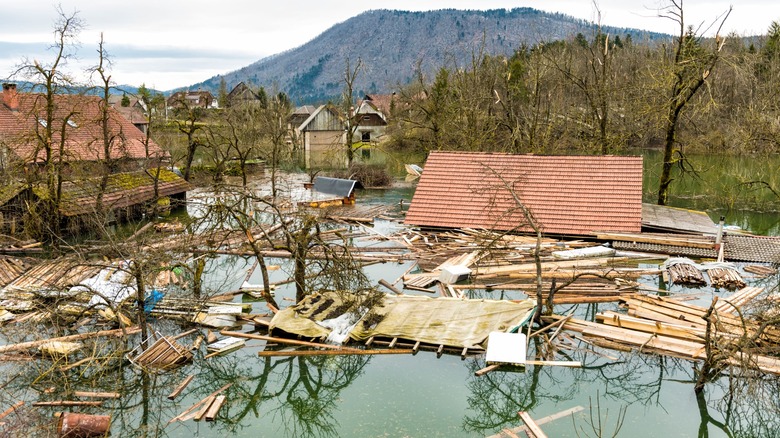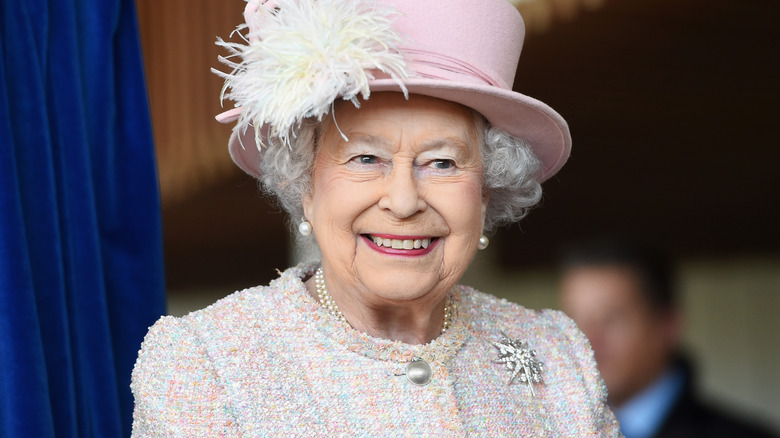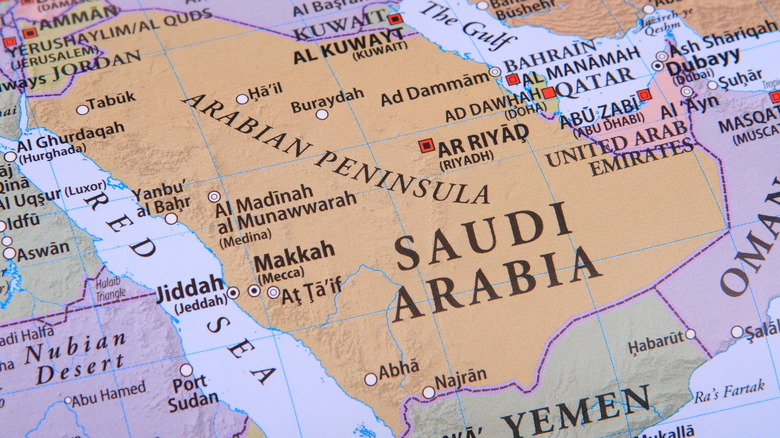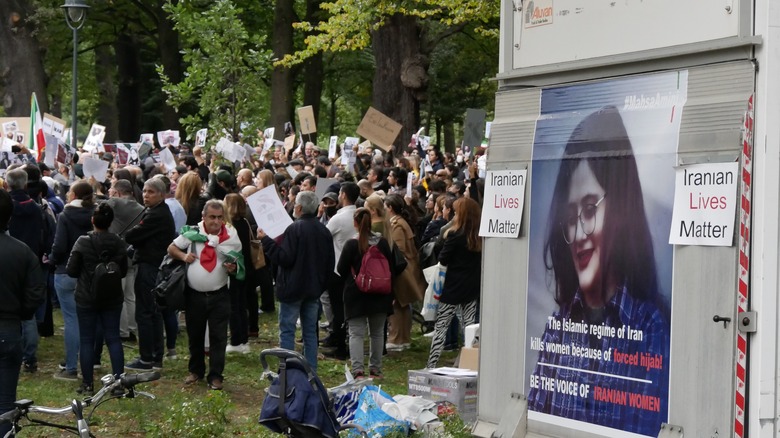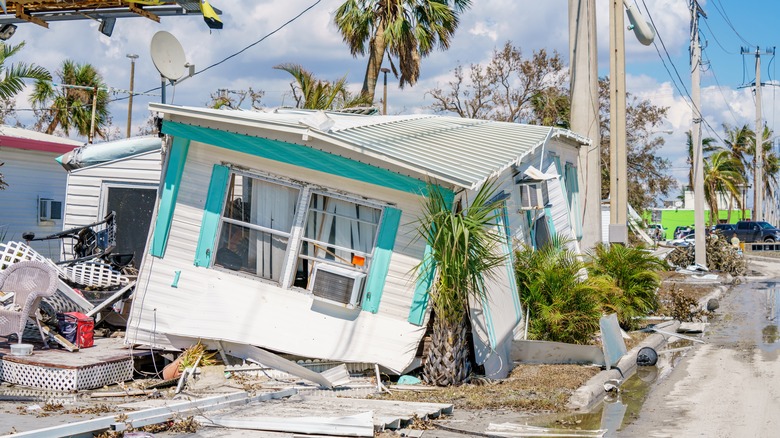Moments Of 2022 That Shook The World
It's hard to sum up a whole year with a list of moments. What makes the list? What gets left behind? And is the event globally impactful or are we attributing a Western perspective to it? Nope, we're not; these 2022 moments, no matter where they took place, sent waves around the globe. In fact, some of them still do.
As The Associated Press reports, Russia's invasion of Ukraine in February 2022 has had devastating effects on the global economy and continues to delay recovery for many countries coming out of COVID-19. Then, in September, the suspicious death of a 22-year-old woman who was under the custody of Iran's morality police sparked protests for women's freedom around the world, per BBC News.
But not all defining moments of this year were negative or had devastating impacts — 2022 was also a time for scientific breakthroughs, healing from a global pandemic, and amazing discoveries. So let's explore 13 moments of 2022 that shook the world.
Russia invades Ukraine
2022 began with hopeful talks of economic recovery following the COVID-19 pandemic. But on February 24, a very worrying piece of news made headlines worldwide: Russian President Vladimir Putin announced Russia would invade Ukraine. In explaining his reasons why, however, he wasn't exactly honest, saying, "[The operation's] goal is the protection of people who ... suffered from abuse and genocide from the Kyiv regime." Putin claimed he would liberate Ukraine from fascism and even used the term "denazify." However, as Time reports, Ukraine isn't ruled by Nazis or fascists. Historians suggest the war is Putin's effort to consolidate power against NATO and European democracy.
Since its start, the 2022 Russo-Ukrainian War has displaced millions of Ukrainians around the world (15 to 30 million people, per The New York Times) and is having a negative butterfly effect on the global economy. Per the Times, Gen. Mark Milley, the chairman of the Joint Chiefs of Staff, says that Russia has had over 100,000 casualties, as of mid-November, while an estimated 40,000 Ukrainian civilians have been killed.
And, as The Associated Press reports, the war is deeply affecting the world's economy. After the West sanctioned Russia (with a myriad of companies retreating from its territory and Swiss banks freezing Russian assets), Russia disrupted the food and energy trades. And with Russia being the world's third-biggest petroleum producer and a leading exporter of gas and wheat, the effects were felt immediately. Per the Bureau of Transportation Statistics, the price of gasoline in the U.S. rose 49% between January and June 2022. With the war still ongoing, it might take a while before the economy recovers.
Endurance is found
In 1915, Irish-British explorer Ernest Shackleton and his crew were set on reaching the South Pole aboard their ship Endurance. But, per Smithsonian Magazine, Endurance got stuck in the infamous ice of the Weddell Sea.
Shackleton and his crew camped along the floating ship, intending to wait for the ice to melt and release Endurance from its grip. But 10 months later, the slowly melting ice started to shift around the boat, crushing its wooden frame. On November 21, 1915, the ship flooded and was dragged to the bottom of the Weddell Sea, with Shackleton and his 27 men watching helplessly. Impressively, the whole crew survived the ordeal and made it back to the UK in 1917.
In March 2022, over a century later (and exactly 100 years since Shackleton's funeral), the Endurance22 Expedition located Endurance thanks to ever-better technology and decades of extensive notes and research, per BBC News. Surprisingly, the ship was in pristine condition.
Marine archaeologist Mensun Bound told BBC News: "Without any exaggeration, this is the finest wooden shipwreck I have ever seen — by far. It is upright, well proud of the seabed, intact, and in a brilliant state of preservation." The scientists also explained (via Smithsonian) that this was an incredibly difficult mission, as the Weddell Sea is famous for its harsh conditions, blizzards, shifting ice, and freezing temperatures included.
Global food prices reach an all-time high
As The Guardian explains, there's a direct link between the Ukraine crisis and 2022's global inflation. In March 2022, only one month after Russia invaded Ukraine, wheat prices increased by 19.7%, after Black Sea exports were disrupted. The United Nations' Food and Agriculture Organization shared some bleak statistics: Throughout 2022, food prices continued to grow, peaking between March and July. The categories most affected by inflation have been cereals, oils, and meats. Worldwide, these items cost between a quarter and a third more than in 2021 — the highest-ever food prices recorded by the UN.
Sadly, the countries most affected by the food crisis are developing ones, as an FAO spokesperson explained: "The higher price quotations are particularly concerning for countries already struggling with other crises, including conflict, natural disasters, economic conditions or, as it is often the case, some combinations of those."
World Food Programme, meanwhile, reported that around 828 million people go to bed hungry every night — this is a huge number compared to previous years. WFP also explored the ripple effects of the Russo-Ukrainian war on the food crisis, showing that Asia, the Pacific, and Eastern Africa are the most affected at the moment.
The monkeypox outbreak
The world was still reporting COVID-19 cases when reports of a new outbreak started making the headlines in the United Kingdom. As the UK Government reports, the first case of monkeypox outside endemic countries was identified in London, England, on May 6, 2022 (the carrier was a man traveling from West Africa). Monkeypox is a viral zoonotic disease and its first symptoms can include headache, fever, muscle aches, swollen lymph nodes, and exhaustion. A rash can develop afterward, and in very rare cases, it can even lead to death. The London patient was treated, but several new cases were reported in the following days, and soon, monkeypox spread throughout Europe and North America, too.
At the end of October 2022, the European Centre for Disease Prevention and Control reported over 20,000 cases in EU/EEA countries alone as well as four deaths. ECDC also explains that monkeypox is most easily transmitted sexually, with men who are intimate with each other facing a moderate risk of infection. All other categories face a low risk. But luckily for everyone, monkeypox numbers have been in steady decline since July 2022.
Sagittarius A*
The Event Horizon Telescope is an international astrophysics project designed to closely observe black holes and their immediate environment. On May 12, 2022, EHT brought a monumental breakthrough to the scientific world: Its scientists unveiled the first image of Sagittarius A* (pronounced "Sagittarius A star," as Science explains). This is the supermassive black hole at the center of the Milky Way.
This revolutionary photograph didn't happen by chance — scientists have been studying Sagittarius A* for quite some time. Back in 2008, astronomers Reinhard Genzel and Andrea Ghez concluded our Milky Way black hole has a mass 4.3 million times that of the sun, even though it's mostly dormant ("mostly" means that it can only absorb gas and dust). Sagittarius A* has a diameter of 14.6 million miles , completely dwarfing the sun's diameter of 864,938 miles.
EHT promises to deliver even more information (and hopefully pictures) of the supermassive black hole in the future. After all, the initial picture is just a shy start: Because Sagittarius A* itself is completely dark, all we really see is the glow of the gas that surrounds it, as well as the way its gravity bends the light around it. Finally, the EHT picture confirmed Albert Einstein's theory of general relativity predictions — our scientific understanding of the world is slowly but surely coming together.
The Afghanistan earthquake
On June 22, 2022, a 5.9 magnitude and 6.2 miles deep earthquake struck Afghanistan, as the Center for Disaster Philanthropy reports. The most affected regions were Gayan, Nika, Barmal, and Paktika, with the city of Khost being the closest to the epicenter. Close to 120 million people felt the ground shaking, in Afghanistan, Pakistan, and India. According to CNN, over 1,000 people lost their lives in the first earthquake, and over 1,500 were injured. Several aftershocks — including a 4.3 magnitude earthquake two days later — killed more. The number of casualties makes this the deadliest earthquake of 2022, and sadly, it had a devastating effect on Afghanistan, a country that was already experiencing turmoil.
The Afghanistan earthquake destroyed vital infrastructure (schools, hospitals, water networks) and left several people homeless. After the Taliban gained control of Afghanistan in 2021, the U.S. interrupted funding and cut off international reserves, so the country was already suffering economically in a big way; CNN reports 20 million people (half the country's population) are living on the brink of famine. This is why the Red Cross and other international organizations stepped in to help people recover from the disastrous impact of the 2022 earthquake. Food, water, shelter, and medical care have helped Afghanistan slowly get back on track, but there is still a long way to go.
Salman Rushdie is stabbed
Salman Rushdie was born in India to non-practicing Muslim parents, per BBC News. He wrote 14 novels and continuously advocated for freedom of expression and religion, himself an atheist. Sadly, this earned him an ongoing war with the Muslim world. After he published "The Satanic Verses," former Iran leader Ayatollah Khomeini issued a fatwa, offering rewards for the killing of anyone involved in the publication. Rushdie could not go back to his home country and lived in hiding for a full decade. Meanwhile, a Norwegian publisher and a Japanese translator were killed as a result of the fatwa.
In 2007, Rushdie was knighted by Queen Elizabeth II, and one Muslim cabinet minister reacted by saying this justified suicide attacks. In the summer of 2022, however, Rushdie confessed to living a normal, fear-free life (via The Guardian). This would all change on August 12, 2022: Rushdie was on stage in Chautauqua, New York, preparing for a speech on artistic freedom when 24-year-old Hadi Matar stabbed him in the neck and torso repeatedly. Outrageously, Matar pleaded not guilty.
Rushdie was taken to a hospital and underwent surgery, but the recovery is far from over. In October, literary agent Andrew Wylie told the Spanish daily El Pais (via NPR) that Rushdie has lost sight in one eye and use of his left hand. His survival — and the support he's received over the last months — can be seen as the survival of freedom in a worryingly nationalist world.
The Pakistan floods
In August 2022, Pakistan had the worst flood in the world since 2017, after severe monsoons submerged entire cities and villages (via UNICEF). More than 1,000 people died in the floods' immediate aftermath, while millions of others were left in life-threatening situations. According to UNICEF's report, there are as many as 10 million children that need immediate support, months after the floods. UNICEF Representative Abdullah Fadil explained why: "Some families have now been living in derelict makeshift tents for more than eight weeks ... Children are surrounded by pools of stagnant water poisoned with fertilizers and feces, and swarming with diseases and viruses, sometimes meters away from where they sleep."
Indeed, the tragic reality of floods is that, even after the water recedes, survivors are left vulnerable to waterborne diseases and without vital resources such as food and clean water. The IFRC and UNICEF have stepped in, offering shelter, food, water, medical care, and learning centers for the many people that need it. But as of November 2022, per BBC News, there is still much help needed, 1,700 people have died, and the estimated cost of the destruction stands at $30 billion.
Queen Elizabeth II dies
On February 6, 2022, Queen Elizabeth II celebrated her 70th year as queen of the United Kingdom with her Platinum Jubilee. Seven months later, on September 8, the British royal family announced her death (via Twitter): "The Queen died peacefully at Balmoral this afternoon." Queen Elizabeth II was 96 years old at the time of her death. She was the second-longest reigning monarch in world history, surpassed only by French King Louis XIV (he became king at the age of 4 and held the throne for 72 years). Queen Elizabeth II is also the longest-reigning monarch in the UK.
The queen was succeeded by her eldest son, King Charles III. As BBC reports, Charles chose this name (as he also had Arthur, Philip, and George as options), and Charles' was not the only name that was changed. His wife Camilla became the queen consort, and Prince William and his wife Catherine are now the Duke and Duchess of Cornwall and Cambridge. Charles was crowned king on September 10, two days after Queen Elizabeth II's death, but this wasn't the end of her chapter.
Thousands of people gathered at the queen's funeral on September 19, to pay their respects (via CNN). A long list of international political figures also offered their condolences and painted Elizabeth as an exemplary monarch.
The Line begins construction
The Line, by NEOM, is a daring, love-hate project, explains Foreign Affairs Review. NEOM's official website defines The Line as a futuristic zero-carbon megacity project in Saudi Arabia, "a home for people who dream big and want to be part of building a new model for sustainable living, working and prospering." The city will be a 170-kilometer-long line with mirrored cladding; it'll stand 500 meters tall and will be 200 meters wide. Indeed, the project aims for the city to run on renewable energy entirely and promises that its inhabitants will have all the amenities they need within a five-minute walk.
As Time Out Dubai reports, the project was unveiled by Prince Mohammed bin Salman bin Abdulaziz Al Saud in July 2022. But its construction didn't start until October, per NDTV. NDTV also explains that the megacity is not held between two mirrored walls, but between two giant skyscrapers, positioned horizontally.
The Line might seem like proof that humanity (or at least technology) is evolving, butThe Verge paints a worrying picture that includes local workers forcefully relocated and severely mistreated, and Mohammed bin Salman calling the project "my pyramids." Last but not least, the megacity will cost at least $500 billion, and its construction is happening amidst war, famine, and a global economic crisis. Just how The Line will go down in history, we've yet to see.
Iran protests
On September 13, 2022, 22-year-old Mahsa Amini died under very suspicious circumstances, per BBC News. She'd been arrested by Iran's "morality police" (the country's religious police) for not wearing a hijab. Officers hit her on the head with a baton — when she died, the police concluded she suffered a heart attack. They even released a video, showing her collapse inside a "morality classroom," in an attempt to support their claim.
But the news and the video sparked massive unrest in Iran. During Amini's funeral in Saqqez, several women ripped their hijabs in a sign of protest, speaking about decades of female oppression in Iran and demanding freedom from the religious state leaders. Within days, the protests spread internationally and gained unprecedented power — even schoolgirls took off their scarves, and an SCMP news report showed a schoolgirl group chasing a male official from their campus.
According to the nonprofit Iran Human Rights, at least 234 people have died at the hands of Iranian security forces during the protests, but as Iran refuses to give exact numbers, it's estimated the death toll is in fact much higher. As of November 2022, the protests are far from over — perhaps the aftermath will bring a new level of freedom for Muslim women, but it will come at a great cost.
Hurricane Ian
As the National Environmental Satellite, Data, and Information Service reports, Tropical Storm Ian formed in the Caribbean Sea on September 23, 2022. By September 26, it had grown into a hurricane. On September 28, it became a Category 4 hurricane over the Gulf of Mexico: Hurricane Ian hit the coasts of Florida and Cuba with 155 mph winds. Hurricane Ian thus became the fifth-strongest hurricane to ever hit the U.S.
As per The New York Times, the entire country of Cuba lost power as a result of the storm. Huge power outages happened all across Florida as well, with Lee and Charlotte counties amongst the most affected (via CNN). But of course, that's not the only problem.
Hurricanes can claim lives and destroy property in the blink of an eye, and Hurricane Ian was not a small one. A total 109 people lost their lives in the U.S., and two people were killed in Cuba. Several properties have been left damaged beyond repair, and Sanibel Island has been cut off from the mainland — all its residents have been temporarily evacuated until authorities can clear the roads, chase off the alligators, and assess the damage.
Elon Musk acquires Twitter
On October 27, 2022, Elon Musk made the headlines again after he acquired Twitter and fired several top executives as well as 50% of the firm's employees (via The Washington Post). Musk tweeted, "the bird is freed," as a way to signal the end of Twitter bans and, in his view, a protection of freedom of speech.
This generated a huge controversy, with former executives and human rights activists condemning Musk's undemocratic methods. Appearing on the podcast The News Agents (via The Guardian), former Twitter vice president for Europe, the Middle East, and Africa, Bruce Daisley, said: "I think Elon thought he was going to come in and solve everything ... It's pretty evident from every public action that he's taken with this whole acquisition: He doesn't know what he's doing."
Several companies have halted their advertising on Twitter, which has generated a big drop in revenues. The controversy went up a notch when comedian Kathy Griffin was suspended from Twitter after mocking Musk (via NBC News). Of course, this goes against Musk's advocacy for freedom of speech. It remains to be seen just how Musk handles the new acquisition and how Twitter will morph in the near future
